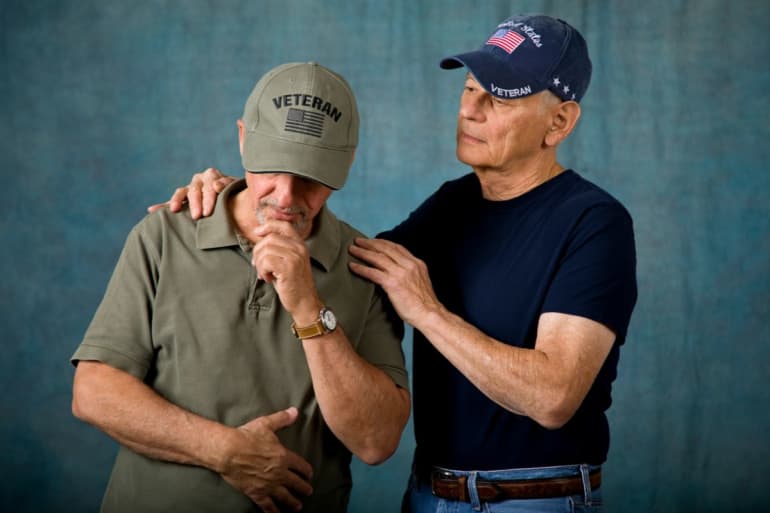It is well known that many veterans battle with post-traumatic stress disorder (PTSD). There can be a sense of hopelessness that comes with PTSD and the desire to do anything that will alleviate symptoms. Commonly, many veterans turn to substance use to self-medicate, which can ultimately lead to substance use disorder (SUD). Self-medication is not the only reason why veterans may come to struggle with SUD. If you or someone you know is a veteran struggling with the harsh realities of SUD, there is hope and help available. Understanding the connection between substance use and PTSD in veterans can be a great start.
Why Do Veterans Experience Co-Occurring Substance Use and PTSD?
PTSD affects veterans differently than civilians. When in the military, service members can experience events that potentially leave them with difficulties coping in everyday life. For veterans with PTSD, it can feel like using substances is the only option to cope. Unfortunately, self-medicating PTSD with alcohol and/or other drugs may exacerbate mental health symptoms when sober. This can also trigger the development of SUD.
It is important to note that SUD does not always occur because someone is self-medicating. Some veterans could be prescribed medications for pain management, which can lead to SUD. Other ways in which individuals develop SUD could include becoming dependent on medications. Benzodiazepines, for example, which are commonly prescribed to treat depression and anxiety, can also be addictive. Depression and anxiety are common co-occurring issues veterans struggle with.
As veterans age, they may also feel it is too late to get help. This mindset could be yet another explanation as to why veterans resort to substance use. Veterans may also experience fear of not being understood by civilians. When anyone feels they may be misunderstood when seeking help, they are vulnerable to resorting to maladaptive coping mechanisms. However, whatever the reason someone has for using substances, we believe it is never too late for anyone to get help.
Complications of PTSD in Veterans
Trauma has unique effects on the brain. Traumatic experiences can increase the production of cortisol in the brain, which influences the activation of the body’s fight-or-flight response. Trauma can also have lasting effects on different brain structures, which can then lead to the development of mental health disorders such as PTSD. These overwhelming responses can be extremely difficult to manage without knowing proper healthy coping skills.

When someone experiences trauma and develops PTSD as a result, it can make daily activities difficult, such as sleeping. Getting good quality sleep plays an essential role in well-being. The ability to sleep well can also be a complication of PTSD in veterans. Moreover, some warning signs of PTSD can include flashbacks, nightmares, or intense distress when triggered or stressed.
Healing From Substance Use and PTSD at Hawaii Island Recovery
Hawaii Island Recovery can be a safe space for veterans to work on healing from PTSD. Our rehab in Hawaii can accommodate up to eight clients at a time. This small program size allows our team to help individuals such as veterans to address their trauma and learn how to cope in healthy ways. When someone struggling with SUD comes to us for help, we can offer detoxification to those who need it. This process can be done safely and under medical supervision.
Our treatment location is home-like, and the treatment plan we provide is individualized. We can work with many different insurance plans as well. Moreover, we specialize in the treatment of SUD, PTSD, and other related mental health issues, such as depression and anxiety. Veterans commonly struggle relating to civilians after retiring from the military, which can contribute to depression and anxiety. Furthermore, we want to assure all clients receiving treatment from us at Hawaii Island Recovery is going to be beneficial and can improve their quality of life.

Post-traumatic stress disorder, or simply PTSD, is a condition that affects people long after they experience a traumatic event. At Hawaii Island Recovery, patients have therapeutic alternatives to deal with and overcome trauma.
More infoUnderstanding the Treatment Journey for Veterans
People who are struggling with PTSD and SUD sometimes isolate themselves or engage in risky behavior. Whatever specific symptoms there may be, we want to support recovery. We are able to offer residential treatment for a minimum of 30 days and up to 90+ days, depending on each person’s needs. Moreover, we also understand the importance of outpatient and aftercare. We believe utilizing aftercare plans can help individuals in recovery from SUD to continue their recovery long-term.

Recovery from SUD can be a scary thought for some. We want to assure any veterans seeking help that we are here to help and improve their quality of life. Committing to recovery is brave, and we will assist each individual in the ways we can. As a veteran, it is probable they have seen and experienced trauma that has brought them to a place where they are struggling with SUD on top of PTSD. Everyone deserves to recover in a safe space that we can provide.
It is not uncommon for veterans to struggle with PTSD. PTSD can trigger the development of SUD in many individuals due to multiple factors. We want to best support you in your decision to recover, and we want to give you new coping tools to utilize in your everyday life. We understand that the military can have lasting effects on veterans. We can help you address your PTSD and other mental health issues you may be struggling with. There is hope, and there is help available to you. It is not too late for anyone to choose recovery. Call (866) 390-5070 today for more information on how we can help you.
 Hawaii Island Recovery
Hawaii Island Recovery 










